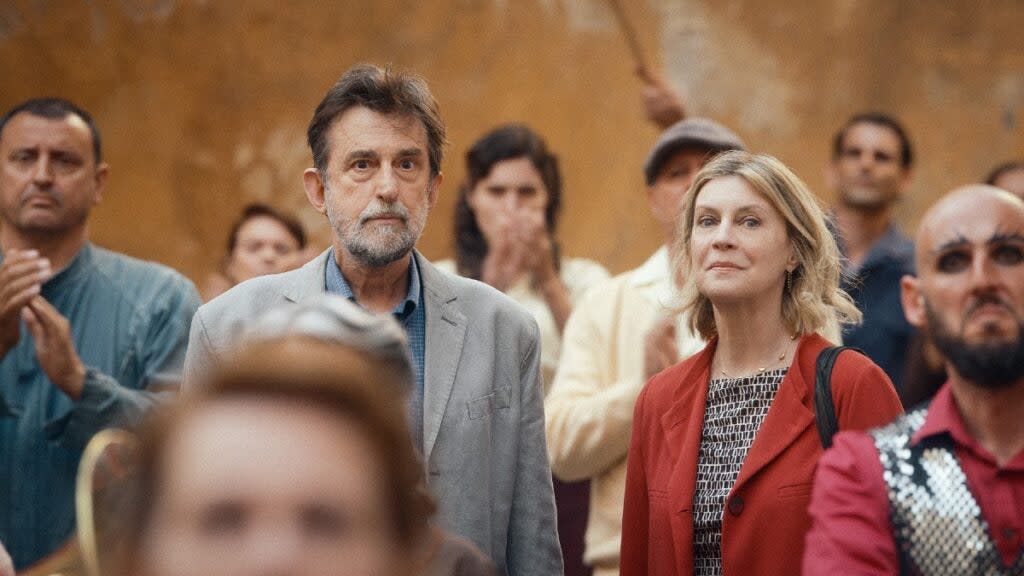‘A Brighter Tomorrow’ Review: Nanni Moretti Returns to Cannes With His Tics and Obsessions Laid Bare

Two years after his previous effort, “Three Floors” opened with a high-profile belly flop, festival-stalwart Nanni Moretti returns to Cannes with “A Brighter Tomorrow,” a comeback of sorts that also airs a list of grievances and could serve – should need arise – as a closing statement.
Not that it likely will. Funny and endearing in some places, and typically grumpy and old-fashioned in others, “A Brighter Tomorrow” should, at very least, keep Moretti far from director’s jail for years to come. And if the sheer existence of this title proves he wasn’t detained for very long, Moretti was very clearly shook by the experience, and very clearly used this follow-up to work through those anxieties.
As in his earlier beloved films “Dear Diary” and “April,” Moretti plays a version of himself, holding the screen as Giovanni (guess what Nanni’s short for), a Roman director about to shoot an historical drama about the schism in the Italian communist party following the Soviet Union’s 1956 invasion of Hungary. Few in his entourage are committed to the project. If the lead actors, played by Barbora Bobuľová and (longtime Moretti fixture) Silvio Orlando prefer to improvise a love story in lieu of Giovanni’s dour script, financier Pierre (a typically wiry Mathieu Amalric, switching between Italian and French) might have never had a dime to begin with.
Also Read:
‘The Pot au Feu’ Review: Juliette Binoche and Benoit Magimel Shine in a Lush, Kitchen-Set Romance
As to his wife and producing partner, Paola (Margherita Buy, of course), well, on the professional front she’s busy producing her first standalone film, and on the domestic front she’s planning a divorce. Even Giovanni himself doesn’t seem too enthused by his political docudrama, as he mostly daydreams about other films he could make –- projects like an adaptation of “The Swimmer” (though he could stand to lose to a few pounds and turn back the clock a few years) or a decade spanning romantic musical scored to most emblematic Italian pop songs of the day.
Giovanni the character can only dream of paths not taken, but Moretti the filmmaker can actually literalize them on-screen. And so, with its digressive and conversational nature, “A Better Tomorrow” feels a lot like an artist opening up a box of long-gestating ideas and throwing them all at once. Moretti seems wistful about the future and sentimental about the past – making numerous references and homages to his previous films – but is quite grumpy about the present.
Also Read:
Cannes: Hong Sang-soo’s ‘In Our Day’ Nabbed by Cinema Guild
That is the foundation of his screen persona. In some ways the joke is always on Giovanni because he’s never the butt of any punchline. When describing his historical drama to an actor incredulous about communists in Italy (“I thought they were in Russia!”), or trying to rescue his financing with an assist from Netflix (“Our product is seen 190 countries,” the executives repeat as a mantra), Moretti always stands as the straight-man in a world gone mad. He shrugs and sighs, and casts a downward glance as if to say, “get a look at this rube,” and “can you imagine that?” Though repeating that pattern time and again without any self-effacement could come off priggish at best and reactionary at worst, so thankfully the narrative does see Giovanni let go and learn to love to bomb.
But, as he says to those Netflix execs, Giovanni (and the Nanni he speaks for) doesn’t believe people change all that much, and so much of “A Brighter Tomorrow” finds Moretti saying, “here I am world, take it or leave it.” What an odd little paradox: By doubling down and not at all trying to soften his image for potential new fans, Moretti might have offered the perfect point of entry, with all of his tics and obsessions laid out for all to see.
Also Read:
Cannes 2023: See the Star-Studded Red Carpet Arrivals (Photos)


